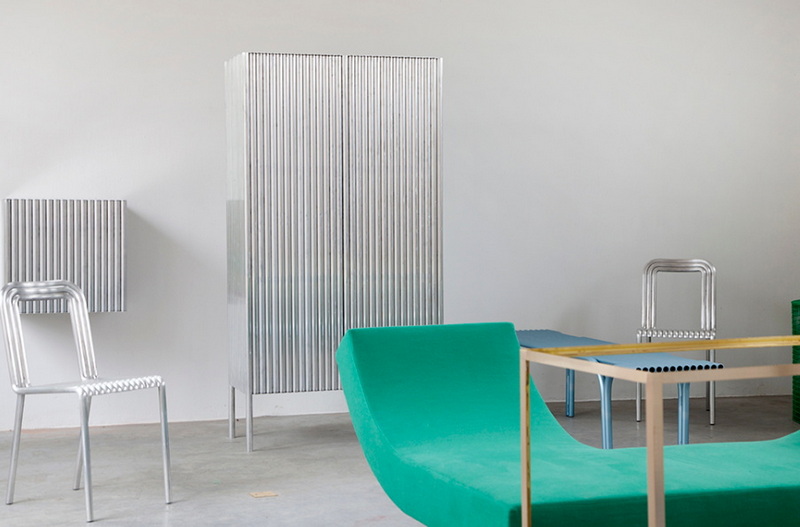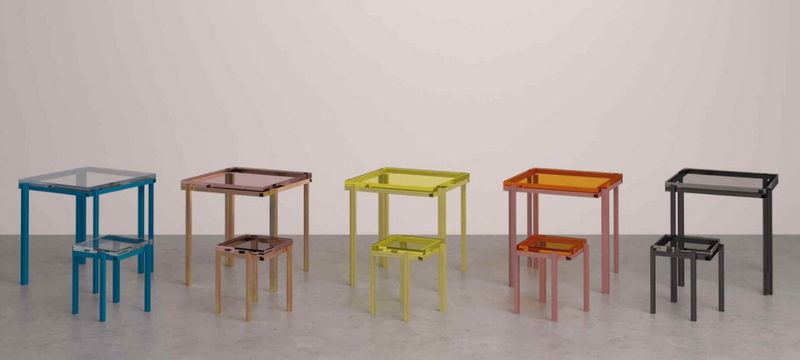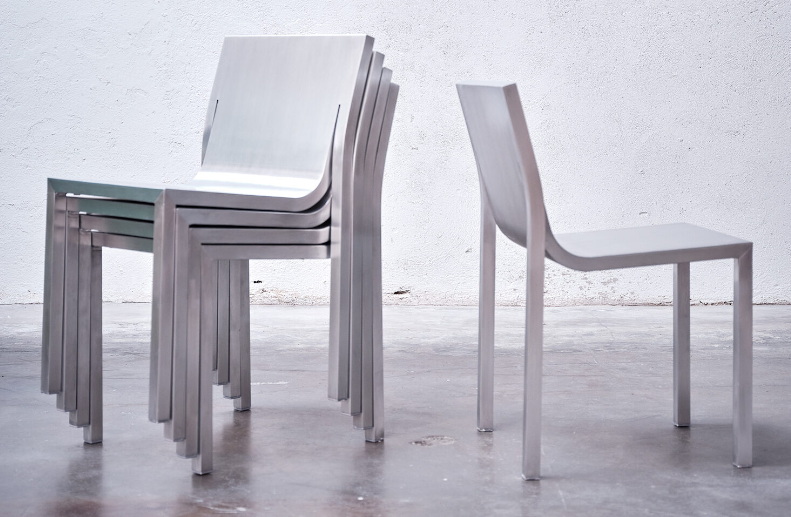Content Menu
● Understanding Aluminum Extrusion
● Benefits of Aluminum Extrusion in Furniture Design
● Innovative Applications of Aluminum Extrusion in Furniture
● The Role of Technology in Enhancing Aluminum Extrusion
● Market Trends Influencing Aluminum Extrusion Furniture
● Visualizing Aluminum Extrusion in Action
● Conclusion
● FAQ
>> 1. What makes aluminum extrusion a sustainable choice for furniture?
>> 2. How does aluminum compare to wood in terms of durability?
>> 3. Can aluminum extrusions be customized?
>> 4. What types of furniture can be made from aluminum extrusions?
>> 5. How does using aluminum affect transportation costs?
● Citations:
In recent years, the furniture industry has witnessed a significant shift towards sustainable materials and practices. Among these, aluminum extrusion has emerged as a leading choice for eco-friendly furniture design. This article explores the reasons why aluminum extrusion is considered the future of sustainable furniture design, highlighting its benefits, applications, and innovative uses in modern furniture.

Understanding Aluminum Extrusion
Aluminum extrusion is a manufacturing process that involves shaping aluminum by forcing it through a die. This technique allows for the creation of complex shapes and profiles that can be used in various applications, including furniture design. The process is not only efficient but also environmentally friendly, making it an ideal choice for sustainable practices.
The aluminum extrusion process begins with heating aluminum billets until they become malleable. Once heated, the aluminum is pushed through a die that shapes it into the desired profile. After extrusion, the material is cooled and cut to length. This method allows for precise control over dimensions and tolerances, resulting in high-quality components suitable for furniture production.
Benefits of Aluminum Extrusion in Furniture Design
1. Eco-Friendly Material
Aluminum is one of the most recyclable materials available. It can be recycled indefinitely without losing its properties, which significantly reduces waste and energy consumption. Recycling aluminum saves up to 95% of the energy required to produce new aluminum from raw materials, making it a cornerstone of the circular economy.
Furthermore, using recycled aluminum reduces greenhouse gas emissions compared to producing new aluminum from bauxite ore. This reduction aligns with global sustainability goals and helps combat climate change.
2. Durability and Longevity
Furniture made from aluminum extrusion is known for its strength and durability. Aluminum is resistant to corrosion, rust, and weathering, making it suitable for both indoor and outdoor applications. This longevity means that aluminum furniture can last for decades, reducing the need for frequent replacements and minimizing environmental impact.
Aluminum's ability to withstand extreme temperatures also makes it an ideal choice for outdoor furniture. Unlike wood or plastic, which can warp or degrade under harsh conditions, aluminum maintains its structural integrity over time.
3. Lightweight Yet Strong
One of the standout features of aluminum is its high strength-to-weight ratio. This characteristic allows for the creation of lightweight furniture that is easy to move and reconfigure without compromising structural integrity. This flexibility is particularly beneficial in urban living spaces where adaptability is key.
The lightweight nature of aluminum also contributes to lower transportation costs and reduced carbon footprints during shipping. Manufacturers can transport more units at once without exceeding weight limits, further enhancing sustainability.
4. Design Versatility
Aluminum extrusion offers unparalleled design flexibility. Designers can create intricate shapes and profiles that enhance the aesthetic appeal of furniture. The ability to customize colors and finishes further expands creative possibilities, allowing for unique pieces that cater to diverse tastes.
Innovative techniques such as anodizing can enhance the appearance of aluminum while providing additional protection against wear and tear. Anodized finishes are available in various colors and textures, allowing designers to achieve specific looks while maintaining durability.
5. Low Maintenance
Aluminum furniture requires minimal maintenance compared to traditional materials like wood or steel. Its resistance to moisture and UV rays means that it does not warp or fade over time, making it an ideal choice for outdoor settings where durability is essential.
Cleaning aluminum furniture typically involves just soap and water, making upkeep straightforward and hassle-free. This low maintenance requirement appeals to consumers looking for practical solutions without sacrificing style.

Innovative Applications of Aluminum Extrusion in Furniture
As designers continue to explore the potential of aluminum extrusion, several innovative applications have emerged:
- Modular Furniture Systems: Brands like IKEA have embraced aluminum extrusion to create modular furniture that can be easily disassembled and reconfigured. The DELAKTIG series exemplifies this approach, allowing users to adapt their furniture to changing needs over time.
- Sustainable Urban Furniture: Cities are increasingly incorporating aluminum extrusions into public spaces through benches, bike racks, and lighting fixtures. These pieces not only enhance urban aesthetics but also withstand harsh environmental conditions.
- Custom-Built Solutions: DIY enthusiasts are leveraging aluminum extrusion to create custom furniture tailored to their specific needs. Online platforms provide resources and designs for creating everything from desks to shelving units using aluminum profiles.
- Innovative Designs: Designers are experimenting with aluminum's properties to create unique pieces like the Bello! bench, which features a tactile surface inspired by pasta shapes. Such designs emphasize both functionality and artistic expression.
- Office Furniture: With remote work becoming more prevalent, companies are investing in ergonomic office furniture made from aluminum extrusion. Desks with adjustable heights allow users to switch between sitting and standing positions easily while maintaining stability.
The Role of Technology in Enhancing Aluminum Extrusion
Technological advancements play a crucial role in optimizing aluminum extrusion processes. Innovations such as 3D printing are being integrated into design phases to minimize waste and enhance precision. These technologies allow designers to prototype quickly and efficiently, leading to more sustainable production practices.
Additionally, computer-aided design (CAD) software enables designers to visualize their concepts before production begins. This capability reduces errors during manufacturing and ensures that each piece meets specific requirements.
Market Trends Influencing Aluminum Extrusion Furniture
As sustainability becomes a priority across industries, several market trends are influencing the growth of aluminum extrusion in furniture design:
- Consumer Demand for Sustainability: Today's consumers are increasingly aware of environmental issues and seek products that reflect their values. Brands that prioritize sustainable materials like aluminum extrusion are likely to gain a competitive edge in the market.
- Collaboration Between Designers and Manufacturers: Partnerships between designers and manufacturers are fostering innovation in aluminum extrusion furniture design. Collaborative efforts lead to unique products that push the boundaries of traditional furniture concepts.
- Focus on Minimalism: The minimalist design trend emphasizes simplicity and functionality over ornate details. Aluminum's clean lines and modern aesthetic align perfectly with this movement, making it a popular choice among contemporary designers.
Visualizing Aluminum Extrusion in Action
To truly appreciate the beauty and versatility of aluminum extrusion in furniture design, consider exploring visual content that showcases innovative designs:
- Video Demonstrations: Platforms like YouTube feature videos on creating unique aluminum extrusion furniture pieces, highlighting craftsmanship and design techniques.
- Image Galleries: Stock photo websites offer extensive galleries showcasing various forms of aluminum extrusions used in contemporary furniture designs.
- Virtual Showrooms: Many manufacturers now provide virtual showrooms where consumers can explore different designs made from aluminum extrusions interactively.
Conclusion
Aluminum extrusion stands at the forefront of sustainable furniture design due to its eco-friendly properties, durability, lightweight nature, versatility in design, and low maintenance requirements. As manufacturers continue to innovate with this material, we can expect even more creative applications that align with sustainability goals.
The future of furniture design lies in materials that not only meet aesthetic demands but also contribute positively to our environment. By embracing aluminum extrusion, designers are paving the way for a more sustainable future in furniture manufacturing.

FAQ
1. What makes aluminum extrusion a sustainable choice for furniture?
Aluminum can be recycled indefinitely without losing quality, significantly reducing waste and energy consumption compared to other materials.
2. How does aluminum compare to wood in terms of durability?
Aluminum is more resistant to weathering, corrosion, and decay than wood, making it a longer-lasting option for both indoor and outdoor furniture.
3. Can aluminum extrusions be customized?
Yes! Aluminum extrusions can be shaped into various profiles and finished in different colors, allowing for extensive customization in furniture design.
4. What types of furniture can be made from aluminum extrusions?
A wide range of furniture can be made from aluminum extrusions including chairs, tables, benches, shelves, modular systems, office desks, and outdoor seating solutions.
5. How does using aluminum affect transportation costs?
Due to its lightweight nature, transporting aluminum furniture incurs lower handling costs compared to heavier materials like wood or steel.
Citations:
[1] https://madburyroad.com/blogs/outdoor-furniture-blog/5-benefits-of-aluminum-furniture
[2] https://extrual.com/en/use-of-aluminium-in-urban-furniture-a-sustainable-trend/
[3] https://www.gabrian.com/6-key-reasons-to-choose-aluminum-extrusions-for-your-project/
[4] https://www.istockphoto.com/photos/aluminium-extrusion
[5] https://www.youtube.com/watch?v=rXNCZo1KxWc
[6] https://design-milk.com/bello-is-an-extruded-aluminum-bench-inspired-by-pasta/
[7] https://www.fortune-alu.com/info-detail/future-trends-in-aluminum-extrusion
[8] https://www.shapesbyhydro.com/en/sustainable-design/with-ikea-a-new-way-of-manufacturing-furniture-with-aluminium/
[9] https://kenanmetal.com/the-role-and-importance-of-aluminum-extrusion-in-industry
[10] https://www.istockphoto.com/fr/photos/aluminum-extrusion
[11] https://www.youtube.com/watch?v=iUn8MocLqQs
[12] https://gloriaaluminium.com/blog/the-green-metal-aluminiums-role-in-sustainable-building-solution/






















